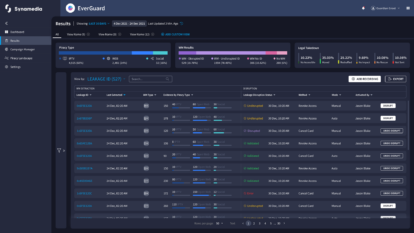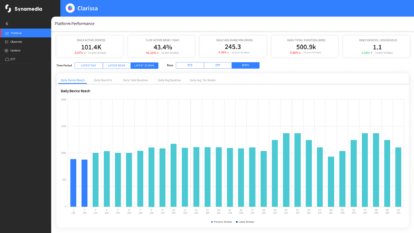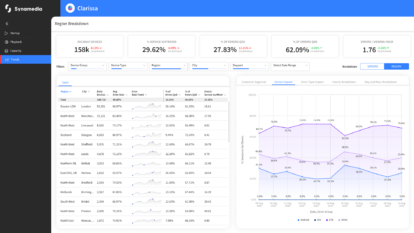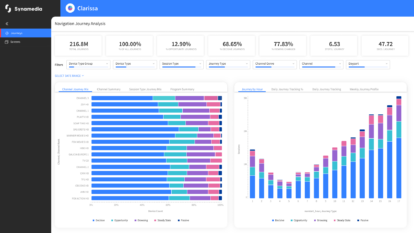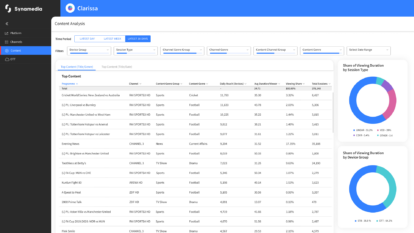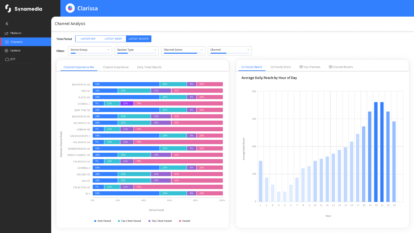LONDON – 30th March 2023 – Leading video software provider Synamedia today announced that yes, the pay-TV subsidiary of Israeli telco Bezeq (TASE: BEZQ), is deploying an enhanced smart TV user experience on its yes+ premium streaming service powered by the Synamedia Go Experience Manager. In addition, yes has released a new range of yes+ smart TV applications developed by 3 Screen Solutions (3SS) in partnership with Synamedia.
yes chose Synamedia and 3SS for its yes+ smart TV apps having previously worked together on the launch of smart TV apps for its StingTV streaming service. The new yes+ apps, which went live last month, support LG webOS and Samsung Tizen operating systems and feature the same look-and-feel and user experience as other yes+ platforms. The newly released smart TV apps are powered by 3SS’ 3Ready framework with video platform technologies from Synamedia, yes’ key technology partner.
To enhance the yes+ user experience, yes has adopted the latest version of the Synamedia Go Experience Manager to deliver an enriched smart TV user experience. This allows yes to personalise the viewing experience with content recommendations based on previous viewing behaviour and what’s trending. Another benefit is the mix of content and channels from a variety of sources displayed into content collections that hyper-personalise the user experience and increase engagement. yes also utilises Synamedia’s security solutions and Video Network technologies including broadcast-equivalent latency for yes+.
Itzhak Elyakim, VP of Engineering and CTO at yes, commented, “We knew that working with Synamedia and 3SS was a very safe bet. We had seen first-hand how the two companies had to overcome a number of technical challenges when developing the StingTV smart TV apps, so we were confident they could repeat this success, and they did. Using this platform enhancement, we now have the operational tools to easily add updates to the yes+ user experience to reflect viewer behaviour and the popularity of content.”
Dr. Tzvi Gerstl, CTO at Synamedia, said, “yes’ commitment to innovation underpins a groundbreaking transition to a premium IP service. Together, we have delivered an exceptional viewing experience for yes+ subscribers and we will continue to collaborate to take advantage of the latest technologies to further enhance the service.”
Kai-Christian Borchers, Managing Director at 3SS, the leading provider of software solutions for STBs, smart TV and multiscreen entertainment, added, “Having collaborated with Synamedia on the successful launch of smart TV apps for yes+, StingTV, and for other video service providers, we are becoming the dream team for Smart TV apps for Synamedia customers. We know how to meet their exacting demands for a seamless user experience across all devices underpinned by solid security and reliability.”
About 3SS
3SS delivers experiences people love. We enable seamless entertainment experiences across all screens, for and together with service providers worldwide. 3SS is the go-to partner to co-create the best possible services in an agile, open and collaborative way. Founded in 2009, we are an acknowledged leader in system integration, software engineering, UI/UX design innovation and solution architecture. We created 3Ready, the world’s leading Entertainment Ecosystem, to accelerate launches of entertainment services on all devices, co-create and enable customercentric innovation. The award-winning 3Ready Entertainment Ecosystem counts 20 operators with 35 million users reach, and two automotive projects. Major operators worldwide rely on 3SS innovation. These include A1 Telekom Austria Group, Allente, Altibox, Astro, Elisa Estonia, Eutelsat, Liberty Global, Norlys, O2/Telefonica, ORS, Proximus, SES, Swisscom, TCC Uruguay, Tele2, TELUS, Vodafone and Yes. Broadcast customers include Blockbuster, Joyn (ProSiebenSat.1/Discovery), ntv, ProSiebenSat.1, SUPER RTL (TOGGO), and Viacom, among others. 3ss.tv, 3ready.tv
About yes and yes+
yes satellite TV was established in 1998 as DBS Satellite Services (1998) Ltd and launched its broadcasting services in July 2000. yes is Israel’s only provider of multi-channel television broadcasts via satellite, and was the first company to offer digital broadcasts and interactive television services. Since its establishment, the company has recruited over 579,000 subscribers constituting more than 40% share of Israel’s multi-channel television market. yes currently employs a staff of 1000. The company’s turnover in 2013 totaled about 1.63 billion NIS. yes is owned by Bezeq. yes announced and initiated its gradual migration to an IP service several years ago. More than half of its subscribers are already on the IP platform, with yes+ as the premium service, making yes the largest IP TV service provider in Israel.
For press and analyst queries, please contact:
Rachel Postlethwaite (EMEA)
About Synamedia
We’re trusted by service providers and content owners to deliver, enrich, and protect video. The flexibility and agility of our cloud and SaaS products enable customers of all types and sizes to launch, monetise, and scale services at speed. Our award-winning portfolio includes advanced advertising, business analytics, broadband and streaming video platforms, intelligence-led anti-piracy, and video network cloud and software solutions. Synamedia is backed by the Permira funds and Sky.
Twitter: @SynamediaVideo
LinkedIn: Synamedia
